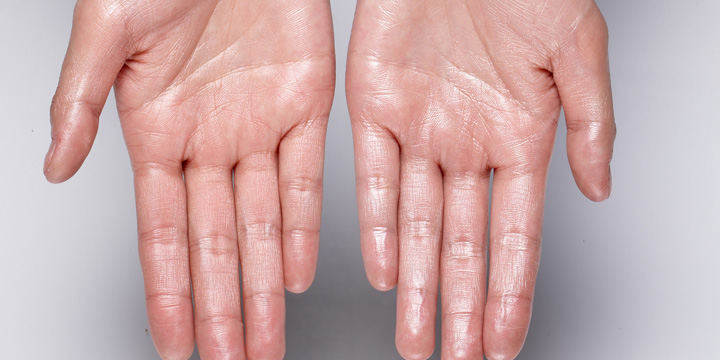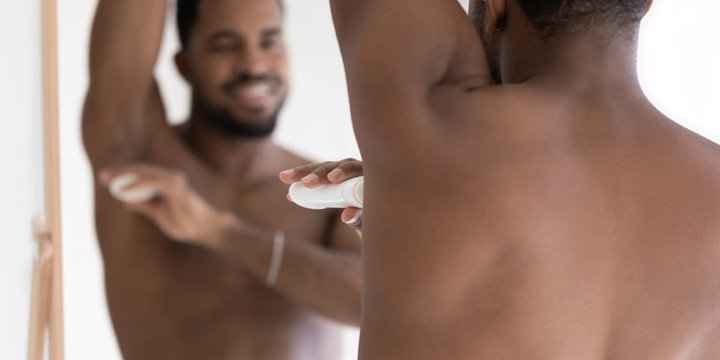
Sweating is a normal and important bodily function. It helps control your body temperature, keeps your skin hydrated, and helps balance the body’s fluids and electrolytes. However, people with diabetes can experience altered sweat patterns. Read on to learn more about sweats and diabetes.
Does diabetes affect people’s sweat?
People with diabetes can experience unusual sweating patterns – such as increased or decreased sweating, night sweats, or sweating while eating – for a variety of reasons. Check out the different types of sweat changes below.
Types of sweating changes
Increased sweating
Increased sweating can be caused by either hyperglycemia (high blood sugar) or hypoglycemia (low blood sugar).
In people who have consistently high blood sugar levels, increased sweating may be related to nerve damage. Essentially, the nerves that regulate the sweat glands are constantly active, and this results in increased sweating. Usually, the palms of the hands, soles of the feet and sometimes the face are affected; however, the entire body can sweat as well.
In people who have consistently high blood sugar levels, increased sweating may be related to nerve damage. Essentially, the nerves that regulate the sweat glands are constantly active, and this results in increased sweating. Usually, the palms of the hands, soles of the feet and sometimes the face are affected; however, the entire body can sweat as well.

Gustatory sweats
The word gustatory comes from the Latin term gustare, meaning “to taste.” Gustatory sweating means sweating that happens when you are eating, smelling or even just thinking about food. This type of sweating generally occurs on the forehead, scalp, neck and upper lip. It is more common in people with diabetes – especially those with type 2 diabetes – than in people who don’t have the condition.

Night sweats
Night sweats are often caused by low blood sugar levels, which can happen in people who take insulin or certain diabetes medications (such as sulfonylureas). When your blood sugar drops too low you produce excess adrenaline, which causes sweating.
Other factors that can cause night sweats include exercising too close to bedtime and drinking alcohol in the evening.

Decreased sweating
Decreased sweating is far less common than increased sweating in people with diabetes but may occur in those who have nerve damage (diabetic neuropathy). The damage that occurs to the nerves with this complication can interfere with the ability of the sweat glands to function properly.
When to seek medical help
You should talk to your healthcare team if:
- You notice that you are sweating more than usual
- You experience night sweats for no obvious reason
- Excessive sweating is interrupting your daily routine
- Sweating is causing you physical or emotional distress
Is there any treatment for excess sweating?
Controlling your blood sugar is one of the best ways to prevent excessive sweats from happening. Sometimes, adjusting your exercise time or eating a snack before bedtime can help. Your healthcare team can help you modify your diet, exercise or medication regimens to reduce or eliminate excessive sweating.
If excess sweating is interfering with your physical and emotional health, there are some treatments available. These include over-the-counter treatments, prescription lotions or pills, botulinum toxin (BotoxÒ) injections or surgery. Another procedure, called iontophoresis, can be performed; this involves treatment of the affected areas with an electrical current.

Tips for coping with excess sweating
There are a number of things you can do to prevent or manage excess sweats, including:
- Wearing loose-fitting clothing made of natural materials
- Bathing daily and applying antiperspirant to your underarms
- Changing socks often and keeping your feet dry
- Practicing relaxation techniques to reduce stress-related sweating (e.g. yoga, meditation)
- Limiting the amount of spicy food you eat
- Avoiding drinking alcohol, especially right before bed
- Wearing shoes made of natural materials (e.g. leather, cotton)
Excess sweating is more common in people with diabetes. However, there are some things you can do to prevent or manage the condition. Talk to your healthcare team about strategies to cope with excess sweating.




